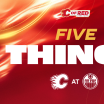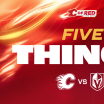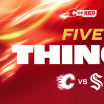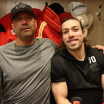The 60-year-old man sat slumped in the wheelchair receiving visitors that night on floor level at McNichols Arena a quarter-century ago.
He'd been driven the hour, those 70 well-travelled miles from Colorado Springs to Denver, by ambulance after undergoing a pulverizing chemotherapy treatment at Penrose Hospital.
"The draft,'' whispered Calgary Flames' assistant coach Paul Baxter, reflective after seeing his old mentor in such a deteriorated condition, "was, what, only three months ago, and he was his old self there. 'Hey, kid!' Slapping you on the shoulder.
"He needs our prayers. But he's a strong man. A fighter."
The cancer that was insidiously attacking Bob Johnson's brain had left him without speech, unable to communicate outside of a pen and paper to jot on. He was gaunt, one side of his body paralyzed.
A male nurse stood close by.
What struck the lucky ones called in for a short visit, though - Mario Lemieux. Bryan Trottier. Lanny McDonald, others - were those eyes. Bright, alert, still curious.
Bob Johnson's legacy lives on 25 years later
Former Flames' coach Bob Johnson, who passed away 25 years ago, had a lasting impact on the many lives he touched through his hockey journey
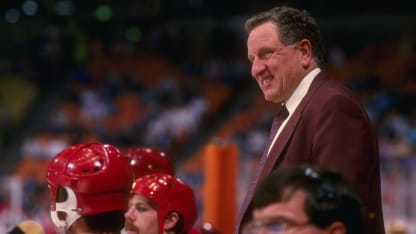
Eyes are often - too often perhaps - referred to as a window to the soul.
But in this case, on that night, with this man, that timeworn cliché applied.
"He may be in a chair,'' said Doug Risebrough, a heart-and-soul centreman under Badger Bob's tutelage, "but you look in those eyes - almost sparkling - and he's the same guy."
Seems impossible but Badger Bob Johnson has been gone 25 years Nov. 26th.
He'd pass away three months following that courageous trip to Denver to attend the Calgary Flames-Pittsburgh Penguins pre-season game and visit with the people who'd populated his working life for a decade.
Maybe the general manager who took a gamble on hiring an eccentric legend away from the University of Wisconsin, shrewd enough to drop a whoopee cushion into the staid old-boys NHL network, had the best read:
"Badger,'' said Cliff Fletcher simply, "was like medicine."
To this day, Bob Johnson remains the longest-serving Calgary Flames' coach. He took a prohibitive underdog in '86 to the Stanley Cup final, engineering Calgary's (to date) lone playoff victory over the the Edmonton Oilers in the process.
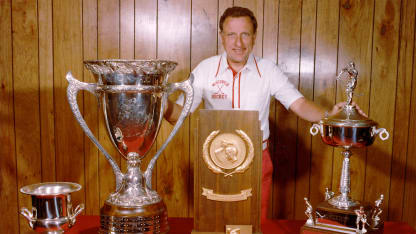
He helped players become everyday NHLers, stars and Hall of Famers.
The notebooks. The nose-pulling. The energy that seemed to come off him like heat from an outdoor cooker.
Those analogies: The mountains to climb and golf courses to tame. The irrepressible zest for life. That 7-point plan to beat the unbeatable Oilers in '86. The 10 temperature changes from the time he hopped out of bed one morning to the time he reached the Saddledome.
And the motto that's survived him: "It's a great day for hockey."
"Twenty-five years? Really?'' reflects Badger's assistant at the time, Bob Murdoch, who'd go on to coach the Winnipeg Jets and Chicago Blackhawks and win a Jack Adams Trophy in 1990.
"I remember he'd come into the coaches room in the morning and go: 'Great day for hockey! These people here in Calgary, they're unbelievable. They recognize you and they want to talk hockey.'
"Well, you took a step back from Bob. He had a Flames' cap on. A Flames' jacket on. Flames' pants on. Flames running shoes on.
"He was a walking billboard for the Calgary Flames. And he was so pleased people would recognize him. Well, he practically had a string of neon lights across his body that blinked CALGARY FLAMES on and off.
"You couldn't help BUT recognize him."
Badger once called the offensively-limited Charlie Bourgeois into a power play meeting in his office, along with a host of the usual suspects - Lanny McDonald, Kent Nilsson, Al MacInnis, etc.
Bourgeois (along with everyone else) was plainly baffled by the invitation.
When the players emerged 20 minutes later, Bourgeois looked at one or two quizzical media stragglers and shrugged.
"Was I supposed to serve coffee?''
During a playoff series against Gretzky, Kurri and Co., Johnson outfitted a third-string goalie in an Oiler jersey.
"College coach,'' snorted Oilers' boss Glen Sather, when informed of the unorthodox tactic.
"I was coaching against the Russians,'' parried the Badger, "when he was still in diapers."
Yes, those were indeed rich days for chronicling the big team in this town.
"Badger was the most optimistic, energetic person I ever met in the game,'' recalls Murdoch.
"I can still see him going through the airport at a million miles and hour, talking hockey with anybody who was handy, and poor (wife) Martha lugging three or four suitcases behind him."
From a developmental standpoint, the man's contribution was immense.
"He was gone by '89 but he certainly left his fingerprints on a big chunk of that Cup-winning team,'' says defenceman Al MacInnis, now, of course, a VP with the St. Louis Blues.
"At that stage of our careers, the young guys - Gary Suter, myself, Jamie Macoun, Robs, Otts - could not have had a better, more positive, influence.
"We all owe him so much.
"He changed the culture of the entire organization. He brought conditioning in. He brought nutrition in.
"Change is the hardest thing to institute or to accept. And Badger was a true innovator.
"I mean, people used to make fun of him because he wrote notes on the bench. Can you believe that? What coach today doesn't write notes on the bench?
"His hockey knowledge was SO ahead of the time. He used a left-winger lock against the Oilers. Well, 10 years later, we've got everyone taking credit for inventing it! And Badger was happy to tell us he'd taken it from the Czechoslovakian national team.
"He justified it by explaining that most of our goals came from the right side - Mully, Lanny, Hakan Loob - while all our checkers, the Colin Pattersons and Jim Peplinskis, were over on the left.
"And it worked.
"Well, 10 or 12 years later, I'm watching games on TV and I hear people taking credit for the left-wing lock, and I'm like: 'Are you kidding me?'
"Some of the stuff he tried didn't work. Do you remember the band in the corner of the rink? No? The University marching band, like they had at college games? He wanted to instill that rah-rah college atmosphere into the Saddledome.
"That lasted about two nights."
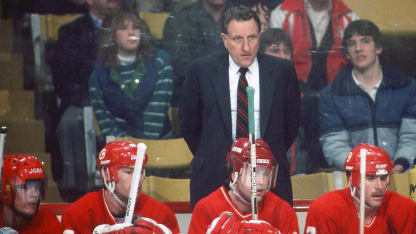
© Steve Babineau/NHLI via Getty Images
Badger used to have Murdoch on the ice at the 'Dome, running through specific situations with five players while he took the rest of the team up to the first balcony, up high for a better view.
"He wanted the guys to see the ice the way Gretzky did. He always was saying 'Gretzky can see 360 degrees when he's on the ice surface' and he wanted our guys to be able to visualize situations the way Gretzky did."
Get a bunch of the old timers together and once the Bob Johnson stories start, they never stop.
"He came into the room once time,'' recalled Gary Suter, who'd grown up in Madison, Wisc., idolizing the Badgers and the Badger,"and asks me: 'How ya feelin', Suter? On a scale of 1 to 10, how do you feel?' So I say: 'A 10, coach!' Then he goes over, punches (Joel) Otto in the shoulder and says: 'And how about you, Otto? How do you feel him?' Well, Joel, of course, tells him: 'I'm an 11, coach!'
"So he turns around, glares at me and yells: 'So Suter, what the hell's the matter with YOU?!'"
Once, some guy off the street showed up with equipment, said he played hockey, and asked Johnson if he could try out. Badger said sure. Showed him where to change.
"So we get out for practice,'' recalls Murdoch, both amused and amazed, "and he says to me 'Oh, Bob, by the way, there's a guy over there. Keep him out of the way, but I told him he could come and skate and try out for the Flames.'
"We didn't know the guy's name; he had no insurance.
"I mean, cripes, the guy could've been a murderer."
The relentless drive to improve was the gasoline for Bob Johnson's engine.
"I've never met a coach, or played for a coach, that loved the power play the way he did,'' recalls MacInnis.
"This was back in the day when hardly anybody practiced it. We would spend 45 minutes to an hour on special teams. Every day.
"That's how we were going to beat Edmonton; he'd tell us. If we could stay with 'em 5-on-5, we'd beat them on the special teams.
"If you look at our power play percentage the years he coached that team … pretty impressive.
"We'd have really competitive specialty teams drills in practices. I remember he'd call Gary (Suter) and I 'The Big Boys.' So when the power play was sputtering and we were waiting our turn, he'd say: "Ah, I've seen enough. Bring on the Big Boys! Bring on the Big Boys!'
"He had those crazy facial expressions. And he'd be crossing his arms over his head.
"But hockey-wise he was ahead of his time. Way ahead."
Unorthodox, perhaps. But that was Bob Johnson. Always looking for a way to make players better.
"Did you know he had Charlie Bourgeois take ballet lessons during the summer to improve his skating balance?'' asks Murdoch. "And Neil Sheehy … geez, Bob knew we had to get tougher to match the Oilers. So all of a sudden Neil Sheehy had once been the heavyweight boxing champion of Harvard.
"Well, Sheehy had attended Harvard, but they didn't have a boxing team there at the time!"
Sheehy was a project of Johnson's. One of those lunch-bucket, role players - his role being to bait Wayne Gretzky and throw the Great One off his game.
"Best advice I ever had,'' says Sheehy, "came from Badger. He pulls me aside one day, sits me down and says: 'Sheehy, do you know you're just like an actor in a Broadway play?'
"I'm sitting on the edge of my seat, you know, soaking this all up, getting a pep talk. "OK, coach. All right, coach. I'm an actor in a Broadway play.'
"And he says: 'Actors have to give the public a good performance right, Sheehy? They've got to ENTERTAIN people.'
"I'm like: 'Yeah, coach. Yeah, they do.'
"He goes: 'And you know what happens, Sheehy, when actors can't act?'
"I say: 'What, coach?'
"He goes: 'We bring in new actors! Now, Sheehy, get out there and act! Entertain those people!'"
One morning, amidst the routine drudgery of a practice day, Johnson noticed that the players in the room weren't paying attention to his diagrams or strategies on the white board on the wall.
Instead, they were staring at the floor.
"So instead of getting mad and yelling at them to look up,'' recalls Murdoch, "he made a rink on the middle of the dressing-room floor, with red tape and white tape, with pucks to move around and everything.
"When we'd go into an opposition rink there'd almost be a competition among everybody as to who could make the nicest rink."
Bob Johnson would leave the Flames organization in the spring of 1987 to serve as President of USA Hockey until 1990.
But he'd return to the NHL and finally climb his mountain, shoot that final round 63 at Augusta and wear the Green Jacket, piloting the Pittsburgh Penguins to the 1991 Stanley Cup title.
No one knew at the time that he only had months to live.
"He was genuine,'' sums up Bob Murdoch. "I mean, that energy, that positive attitude, that was him. He never changed.
"Just so innovative. I know I was a much better coach after having worked with Bob.
"Twenty-five years, you say?
"His legacy is just his love of the game and his contribution to the game. He was absolutely consumed by hockey. He lived it, breathed it. He slept, ate and dreamed hockey.
"He didn't know any other way."
His former assistant, Pierre Page, visited Badger only three days before he died.
"I couldn't stop crying,'' Page recalls. "His daughter was with him. He couldn't speak. He could write, but shaky. But we started a kind of conversation anyway. I'd name a player, this guy or that guy, and he'd give me a thumbs up or a thumbs down.
"Imagine. At that point, after all he'd been through, still consumed by hockey."
A few months earlier, shortly after the tumor was first detected, a shaken Neil Sheehy sat down and penned a note of thanks and encouragement to his old boss.
"When I wrote it,'' reveals Sheehy, now a successful player agent based in Minnesota, "I told him he not only influenced my career, he influenced my life.
"And I meant it. Every word.
"How many times do I find myself spouting a Badgerism? How many times do you?"
Often, if anyone of that era is honest about it. Still. A full quarter-century after that unforgettable night of farewell at McNichols Arena in Denver.
On the rock that serves as a tombstone in Evergreen Cemetery at Colorado Springs, the final resting place of a restless man, is chiseled:
JOHNSON
Robert Norman
March 4, 1931-November 26, 1991
And underneath those essential details, the mantra that survives to this day, and for all time:
"It's a Great Day for Hockey."
Said it. Meant it. Lived it. Left it.

